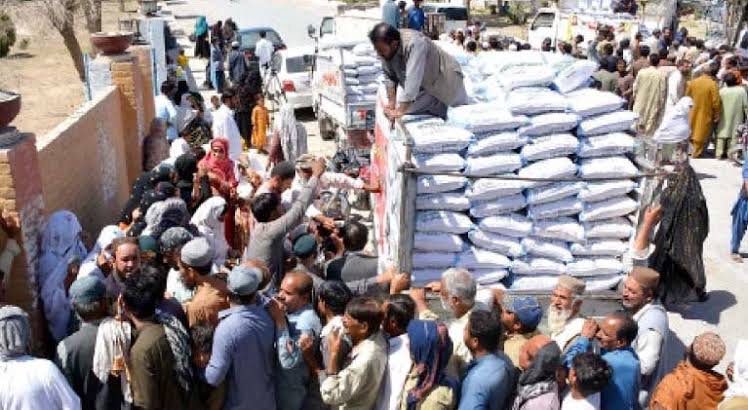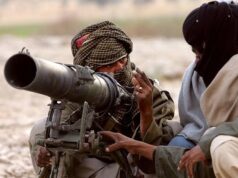Food shortage leads to total anarchy in Pakistan

Pakistan has started burning. An angry Pakistani journalist in the most natural outburst on Twitter cursed her grandfather for making the decision to choose Pakistan over India during partition…A testimony to the fortunes of the two nation theory. While India is a thriving democracy heralded as a emerging economic and military Super power is marching towards becoming the third largest global economy in next few years…Pakistan dealing with food riots and a spiralling economic situation and moving towards becoming a failed State.
There is no end to the miseries of the people in Pakistan as the Islamic nation is facing an incessant economic crisis amid poor governance. High inflation, rising unemployment and a growing shortage of food have led to this muslim nation into a deep crunch.
A large number of underprivileged people across Pakistan, who are not able to afford necessary food items due to rising inflation, are forced to queue for hours to grab a bag of free flour. It is chaos all across the country, as residents are not only facing disgrace but the danger to their lives.
On March 31, eleven people, including women and children, lost their lives in a stampede during the distribution of food aid in Karachi city. At least five other people have been killed and several injured in recent weeks at sites in other provinces in Pakistan. Thousands of bags of flour have also been looted from trucks and distribution points.
Pakistan’s people are distressed due to soaring costs, exacerbated by Pakistan’s falling currency. The government has even removed subsidies due to a settlement with the International Monetary Fund to unlock the latest tranche of its financial support packages. The cost of basic goods across the country has surged, with flour prices rising two-fold.
Razia a resident from Lahore, Pakistan commented on the severe condition of people in Pakistan and said that “We have been coming here for the last 4 days but there has been no progress yet. They have been delaying us saying to come after 5 days. The day before yesterday we came here (to receive flour) at 8 am and went back home at 3pm and yesterday we came at 12 noon and went back at 3 pm. Today we came early, but today even they told us to come after 5 days”.
We have been coming for the past 4 days and failed to get a bag of free flour. They are asking us to come after 5 or 6 days. We have received a message but we haven’t received the flour.
Another resident from Lahore also had similar views on the struggle of the general public in Pakistan. He said, “Due to high Inflation we are struggling and standing here in a queue to get free flour. The situation has become such that there is no job, now what will the labour class (blue collared workers) do? The professionals are getting salaries. But what will the daily wage worker do, is the government thinking about it? If they are thinking then please reply”.
To avail funds from the IMF as part of the 6.5 million USD bailout package agreed upon in 2019, the Pakistani government has made various economic modifications, including the imposition of higher taxes and a hike in fuel prices. The IMF has also asked Pakistan, a country of some 220 million people, to provide its external financing assurances before it takes the next step to release the bailout tranche.
The country, with its poor record of corruption, has foreign reserves of USD 4.2 billion as of the week ended on March 24, which will provide an import cover of less than a month according to the State Bank of Pakistan.
Sharjil Goplani the Chairman of All Pakistan Timber Traders Association said that If you see the currency of Pakistan, it promises to give you gold equivalent to that of the written figure. When a commercial bank with which my money is deposited fails to give me dollars then it has obviously defaulted.
Pakistan has a history of political uncertainty, discontinuity of macroeconomic policies, extremism, corruption and energy shortages.
Such deficiencies create hurdles, preventing Pakistan from becoming an investment-friendly nation. Many foreign companies in Pakistan are on the brink of shutdown.
Pakistan is teetering on the edge of complete chaos as it continues to face political clashes and financial collapse.




